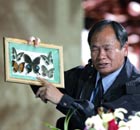Op-Ed Contributors
Fix flaws in election law
By Zhang Qianfan (China Daily)
Updated: 2010-03-04 07:46
 |
Large Medium Small |
Rural and urban citizens likely to have same proportion of deputies but clarity is needed on voting and vote-counting
As the Chinese People's Political Consultative Conference (CPPCC) National Committee and the National People's Congress (NPC) unveil their annual sessions, the public has again cast its spotlight on the long-anticipated amendment of the Law on Elections.
The pending draft, the fifth amendment of the electoral law since it was announced on July 1, 1979, and put into effect on January 1980, stipulates that urban and rural areas will enjoy the same proportion of deputies to the NPC, the top legislature, and the people's congresses at lower levels.
| ||||
However, any articles of law, if they are written only on paper, fail to guarantee the electoral rights of rural residents. More achievable measures should be adopted to improve the implementation of the current electoral law. Poor implementation of the law's article that urban residents have the privilege to elect their deputies to people's congresses at various levels does not bode well for an amendment to ensure that rural voters can fully express their political wishes and realize their interests by voting for their deputies.
Despite its achievement of democracy that mirrors the aims of some Western countries either in theoretical terms or in its process of revision, China's electoral law stops short of specific articles describing concrete details and operational procedures. These articles, however, turn out to be a key factor in deciding whether elections can be successfully carried out.
For example, the law is unclear on its stipulations of where candidates must come from and how candidates must communicate with voters. The law is also evasive about a series of issues, such as the demarcation of electoral districts, the distribution of the number of deputies and balloting and vote counting. Facts prove that such problems, even at the lowest grassroots level, would make the law impractical.
The problem now is that while the "same proportional voting" clause does correct the uneven allotment of deputies among urban and rural areas, it is still far from ensuring that all elections are conducted correctly.
The law's latest amendment draft explicitly stipulates that voters should have more access to information about candidates and that the candidates should communicate with voters more efficiently, which serves as another flashpoint in the revised version. With different interests and stances, every voter should be well-informed about the proposals and political platforms of candidates so that they can vote intelligently and according to their own interests. Open communication between voters and candidates will also make it possible for the final constitution of deputies in an electoral district to represent the fundamental interests of their constituency.
To help realize such a scenario, voters should first be ensured that they will have alternative candidates to vote for. Article 30 of the electoral law stipulates that "the number of candidates for deputies to the national and local people's congresses shall be greater than the number of deputies to be elected". The article, essentially the same principle on the competitive election, gives rise to another question: How are these candidates selected? Are they designated by higher officials or chosen by voters?
It is encouraging that the latest amendment of the law states that all candidates should come from the democratic elections of voters and not through administrative appointments.
Another major problem that decides whether an election is effective is how the electoral law can put a discreet voting system in place that guarantees that all voters vote by their own choice. Past practices indicate that the unsigned balloting system has been exercised in most areas of China, but no effective measures have been adopted to ensure they are conducted in an unimpeded fashion. It is not unusual that voters have not been offered suitable places to write on their ballots, and sometimes some "special watchdogs" have been arranged to monitor ballot casting to influence the process.
Ensuring that votes are counted in an open and objective manner also poses a thorny issue. Possible malpractices and cheats can be effectively prevented if parties of candidates concerned are not involved in the on-the-scene counting. Article 39 of the electoral law stops short of details and effective ways on how ballot counting can be conducted in a just manner to avoid artificial manipulation in the process, although some operational procedures are mentioned.
Ultimately, what does matter is how the latest amendment of the law can help push for an open, timely and immediate counting of ballots at voting sites to stop any possible clandestine operations to tamper with the voting process.
An effective mechanism to settle disputes should also be put in place so that final results can best reflect the majority of voters. Despite its clauses on sanctions against sabotage in the election process, the prevailing electoral law remains elusive on the explicit judicial remedy on electoral disputes. Foreign examples show that only a sound dispute settlement process can ensure that election results reflect the real choice of voters.
The author is a professor of constitutional law with Peking University.
(China Daily 03/04/2010 page8)













